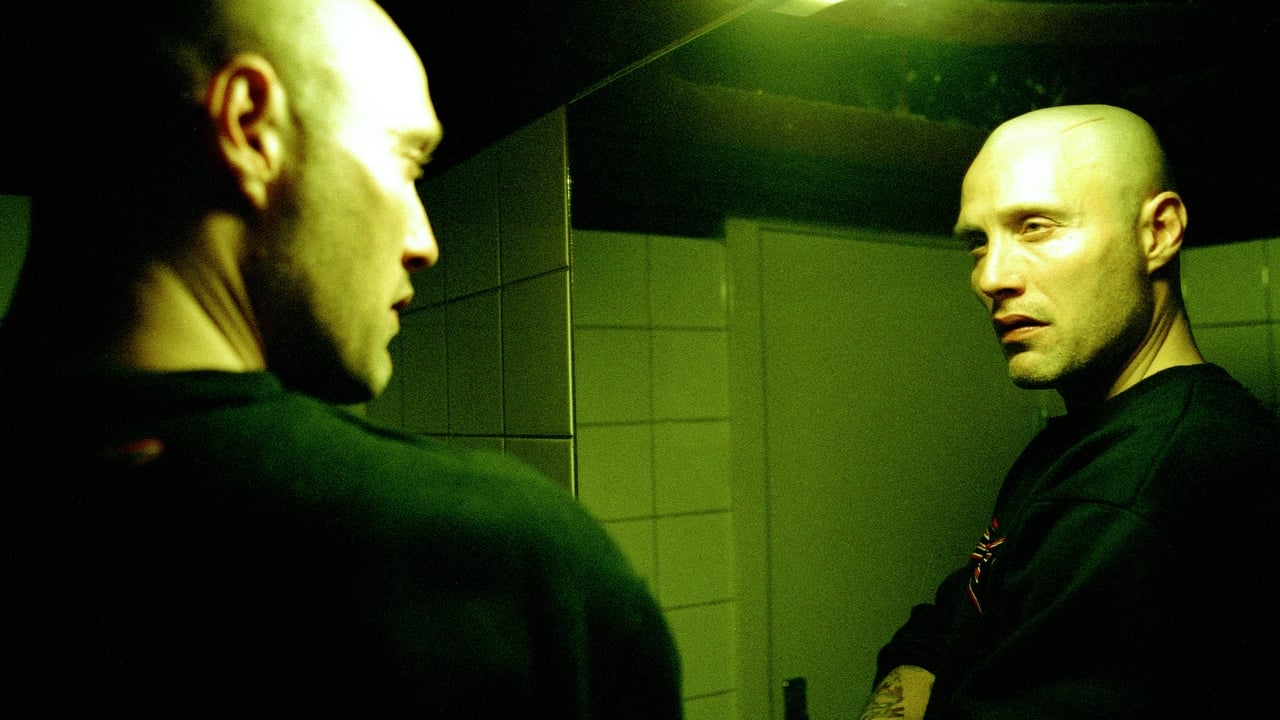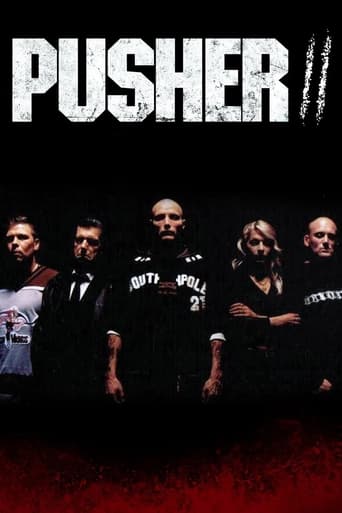

I like the storyline of this show,it attract me so much
... View MoreIt is not only a funny movie, but it allows a great amount of joy for anyone who watches it.
... View MoreIt's easily one of the freshest, sharpest and most enjoyable films of this year.
... View MoreAll of these films share one commonality, that being a kind of emotional center that humanizes a cast of monsters.
... View More"Pusher II" is, in almost every way, an improvement upon the first "Pusher" film. Whereas the first film focused on how the criminal activity of the main character affected his relationships and, subsequently himself, and in doing assumed a very physical and corrosive quality to its narrative, "Pusher II" aims for something more intricate. Instead of focusing on how the professional life of the main character digs into his personal life, the film intertwines both the professional and the personal to the point where they cannot be considered exclusively of one another. This is done with the same style of intelligent and subtle writing displayed in the former film; the main character is Tonny - who was the best friend of Frank, the main character from the first film - and, upon leaving prison, he enters into a criminal automobile business with his father, who also serves as his criminal authority throughout the film. This unstable and often passively hostile relationship serves as the fulcrum of the film's narrative, and from here fork two sub-narratives, each of which pertains to either the professional or the personal aspect of Tonny's life. The personal is a woman he once slept with and mistakenly impregnated. She is seeking what he owes her as the absent father of their son - however, she hates him, and considers him scum of the lowest order. The professional is a friend - or perhaps merely an acquaintance - who slyly ropes Tonny into an attempt on his part to execute a deal, and to settle the resulting debt after that deal blows up in his face. Each of these subplots serve as crucial indications of the narrative's intricate welding of the main character's lives - the personal presents a gradual character development for Tonny, who comes closer to accepting his role as a father as the film progresses, even if it is in an attempt to impress his despondent father. The professional, on the other hand, accentuates the less focal role that the criminal elements of the film play within the narrative. Whereas, in the previous film, the main character spent his time attempting to appease a debt that he was directly responsible for, in "Pusher II" Tonny becomes involved with a man who is attempting the same thing. It can be said that, off-screen, this individual is undergoing a very similar narrative to Frank's from the first "Pusher," yet Tonny's more reclined involvement in it is what we experience within this film. The characters are just as strong and realistic as the first film, thanks to the same characteristically subtle and intelligent writing, combined with nuanced and masterfully refrained performances - particularly from Mikkelsen. There is also greater emphasis on the regard in which supporting characters regard Tonny, in contrast to the first "Pusher," where most characters afforded Frank a relatively equal degree of reverence. The film also serves as a worthwhile sequel - casually referencing aspects of the first film without dwelling on them for the sake of forced interconnectedness. In all, "Pusher II" presents an improved narrative than its predecessor - whereas the former film presented a man and his personal life being eroded by the stress of his professional life, this film presents a man attempting to balance the two, and subsequently commencing a gradual and arduous climb to becoming something more than what he starts out as. The visual elements of "Pusher II" also present a drastic improvement on its predecessor. Whereas the first "Pusher" possessed a rough and raw visual style that suited its narrative very well, "Pusher II" retains this style while managing to improve on certain areas. The camera work is more graceful, without robbing the film of its DIY aesthetic; and the framing of shots is improved, displaying greater composure and aesthetic craftsmanship. The direction also manages to flesh out more intricate features of the writing, often through close-ups and slow push-ins to define states of anxiety or certain mental realisations. Also, the lighting is drastically improved, and hence there are no longer scenes of complete darkness, while all the while maintaining the impression of having been shot exclusively in natural lighting. The film is also able to implement style without interjecting the gritty quality, often through the selective use of music - whereas the first film consisted almost exclusively of rough and ready Punk instrumentals that would often explode into the screen, "Pusher II" contains pieces that steadily build up, hence heightening suspense within key scenes, as well as ambient pieces that are able to add an ethereal mood to scenes of latent and powerful emotion. Certain scenes of subdued tension also sound as though they contain extremely quite harmonies - simmering just beneath surface level. Overall, both the written, acted and visual aspects of "Pusher II" all work harmoniously to bring about a work that is in equal parts rough and realistic as is stylish and at times cerebral. The film maintains the characteristic intelligence and subtlety of the film preceding it, while exploring new narrative structures and presenting greater degrees of intricacy and artistic ability.
... View MoreAfter Refn made an unsuccessful English-language debut with 2003's "Fear X," he returned to Denmark to shoot parts two and three of "The Pusher Trilogy." But the new films aren't a continuation, and the layoff didn't dull Refn's ability to tell an engaging crime story. In "Pusher 2: With Blood On My Hands," the film explores a drug-dealer's former sidekick as he deals with new challenges in the world of crime, drugs, and becoming a father.Frank's ex-sidekick from the first film, Tonny, wonderfully played by Mads Mikkelsen is fresh out of prison. Tonny is eager to prove his worth as earner and son to his crime boss father (Leif Sylvester Petersen), known as the Duke. Routinely called a loser by everyone he knows -- he practically invites abuse by sporting a tattooed "respect" on the back of his bald head. Tonny also tries to ingratiate himself with his recalcitrant father (Leif Sylvester Petersen), who can hardly trust him with anything. The back-breaking straw is the appearance of a baby that Tonny's old non-girlfriend (Anne Sorensen) claims is his. The bitterness and betrayal mounts as Tonny begins to wonder if he should rewrite his life, and the fate of the neglected infant.At its core, the film about is about broken families and serves as a stark reminder of the lasting effects on our actions can have on future generations. Tonny's entire life has been spent on only one thing: trying to gain the approval of his father. And not only that he learns on his release that he is very likely the father of a baby boy, one so neglected by his junkie mother that he hasn't even been given a name yet. Refn is painting a bleak picture of a child without a chance. He is in complete control behind the camera, but this film belongs purely and simply to Mikkelsen. He is absolutely stunning, flawlessly embodying the insecurities and desire that drives Tonny. Against all odds, Tonny becomes a sympathetic hero in an increasingly tragic tale. It's not hard to spot the need that drives his self-destructive behavior: it's practically written all over his face - or at least the back of his head.
... View MoreMads Mikkelsen is awesome, almost superhuman, in his acting here but the movie is quite disappointing. I had seen nr 1 and 3 and now saw this one. Unfortunately it follows the trend of pointless testosterone in Danish gangster movies. Milo only appears briefly. Bodnia does not appear at all. I love Refn as a director and it is not really his fault. The directing and script is great. The supporting actors are so weak as to almost ruin the movie. Mikkelsens dad looks more like Jørgen Leth than a gangster. The acting is so totally amateurish and indeed many of them are not professional actors, I guess. Anyway, this movie (and all of Refn's movies) is still worth seeing.
... View MoreI've seen Pusher II during the Thriller and Film Noir Film festival in Cognac. It was a shock at the end. When lights were on, people don't say a word. The last time I was so mute was at the end of "once were warriors". The violence in Pusher II is so realistic, so close, so terrifying for the future of all the characters than we really hope there will be something, even very little, happy at the end to help us to breath. The main character seems to be a bad guy but he's a loser, looking for the love of a father. All his past, aka his friends, family, etc... are lost. i've met the director, he said this a real look on a way of life in his country; but don't think it's just outside : this story can exists everywhere. Some sequences are like nightmare without sleeping. And for the hero, the last hope in his life is a baby, his son, but for what kind of life ? Incredible, powerful, beautiful, PUSHER II mixes all these feelings to be one of the best movie of this year, a movie which marks your spirit like hot steel.
... View More